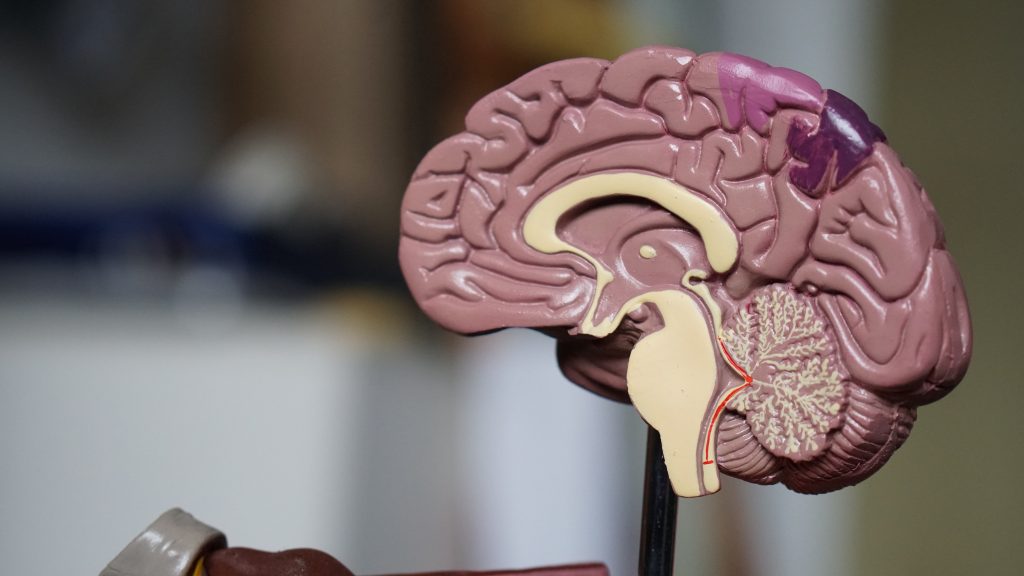Did you know you can learn your genetic risk potential for Alzheimer’s? Did you know Alzheimer’s prevention is possible through diet and lifestyle interventions?
You can be proactive with Alzheimer’s prevention by understanding your genetic risks early.
Alzheimer’s is strongly impacted by genes known as APOE. These genes impact plaquing in the body – both cardiovascularly and in the brain. About 15% of the population carry genetic variation APOE E4, associated with being three times more likely to develop late-onset Alzheimer’s disease, which occurs in people 65 and older.
Many are starting to refer to Alzheimer’s as Diabetes 3. One of the reasons is the role lifestyle and diet can have on whether and how these genes express themselves. But before we dive into what you can do to reduce your risk of developing Alzheimer’s, let’s explore your potential risk factors, especially those related to your genes.

What is Alzheimer’s Disease?
One of the most prevalent forms of mental decline is Alzheimer’s: it affects up to 70 percent of people living with dementia.
About 500,000 Canadians have Alzheimer’s disease, and about 46 million people worldwide live with a form of dementia. This number is expected to increase in the coming years as the baby boomer generation reaches the age of 65 and beyond.
Understandably, most people are keen to do all they can to prevent Alzheimer’s, determine their risks and what they can do to improve their chances of avoiding such a debilitating condition.
As described by the Alzheimer’s Association, Alzheimer’s is a type of dementia that affects memory, thinking and behaviour. Symptoms eventually grow severe enough to interfere with daily tasks.
Symptoms of Alzheimer’s
The most common early symptom of Alzheimer’s is difficulty remembering newly learned information. As Alzheimer’s advances, it leads to increasingly severe symptoms, including disorientation, mood and behaviour change. Other early signs involve:
- Difficulty following a plan
- Difficulty with numbers
- Confusion over a time or place
- Inability to retrace steps
Risk Factors for Developing Alzheimer’s
Current research cannot point to one single cause of Alzheimer’s disease. However, scientists have identified several risk factors such as age, lifestyle, heart health, family history, genetics and the environment that play a role in developing Alzheimer’s.
Age: While age is one of the most significant known risk factors for Alzheimer’s, it is not a normal part of ageing. In other words, increasing age is correlated to high incidences of Alzheimer’s disease, though it is not a direct causation.
The risk of developing Alzheimer’s doubles every five years after the age of 65. Nearly one-third of individuals develop Alzheimer’s after the age of 85.
Family history: Do any of your parents or siblings have Alzheimer’s? Your risk of developing Alzheimer’s increases if more than one family member has it.
Heart health: Remember the expression ‘Healthy mind, healthy heart’? The risk of developing Alzheimer’s is linked to conditions that damage the heart and blood vessels, such as diabetes, stroke, high cholesterol, and high blood pressure. While further studies are needed to understand the link between cardiovascular disease and heart disease fully, it is found that plaquing is present in both the heart and brain in patients with Alzheimer’s, thus causing damage.
Concussion: Head injury has been linked to an increased future risk of developing dementia.
Genetics: The gene with the strongest predictor of Alzheimer’s risk is APOE; there are three common varieties of this gene: APOE E2, APOE E3, APOE E4. Studies have shown that a person who carries the APOE E4 variety is at an increased risk for developing Alzheimer’s. (More on this later.)
Alzheimer’s Prevention with Genetic Testing
Your genes control the function of every cell in your body. Some determine physical traits like the colour of your hair or eyes. Other genes determine your likelihood to develop certain diseases, like Alzheimer’s disease.
Genetic testing is a simple and easily accessible tool to determine your Alzheimer’s risk. Knowing your risk factor is clinically shown to drive positive behavioural, diet, and lifestyle changes effectively.
The Alzheimer’s Gene: APOE
APOE is the most widely studied gene concerning late-onset Alzheimer’s disease. The APOE gene is involved in making a protein that helps carry cholesterol and other types of fat in the bloodstream. It is believed that the APOE gene may influence the accumulation of a protein named amyloid beta, linked to an inherited form of heart disease, high cholesterol and Alzheimer’s disease.
Not all genes are created equal: Determining your APOE risk factor
APOE has three common forms:
- APOE E2 reduces the risk of Alzheimer’s
- APOE E3 doesn’t affect the risk of Alzheimer’s
- APOE E4 increases the risk of Alzheimer’s
Each person inherits two APOE alleles (genetic variation/mutation), one from each biological parent. In determining your risk factor for Alzheimer’s disease, you must look at the combination of APOE alleles you possess.
These are the six different APOE allele combinations you may have: E2/E2; E2/E3; E3/E3; E2/E4; and E4/E4.
The most common form is E3/E3, with a normal lower-risk found in around 55 to 65 percent of the population.
Any of the E4 combinations can mean a higher chance of developing cardiovascular disease and Alzheimer’s disease.
The table below details the APOE allele combinations/genotype and their respective risk levels.
Table 1. APOE status based on the possible APOE allele combinations.
| GENOTYPE 1 | GENOTYPE 2 | APOE STATUS |
| TT | TT | E2/E2 – low risk |
| TT | CT | E2/E3 – low risk |
| CT | CT | E2/E4 – higher risk |
| TT | CC | E3/E3 – lower risk |
| CT | CC | E3/E4 – higher risk |
| CC | CC | E4/E4 – high risk |
As shown in the table below, the risk of developing Alzheimer’s by 85 years of age is exponentially high with the E4/E4 allele combination.
Table 2: Risk of developing Alzheimer’s disease by 85 years of age
| Men | Women | |
| All Genotypes | 10 – 11% | 14 – 17% |
| e2/e2 or e2/e3 | 4 – 5% | 6 – 8% |
| e3/e3 | 7 – 8% | 10 – 12% |
| e2/e4 | 18 – 20% | 27 – 31% |
| e3/e4 | 22 – 23% | 30 – 35% |
| e4/e4 | 51 – 52% | 60 – 68% |
It is important to note that inheriting APOE E4 does not mean that you will develop Alzheimer’s. Some with the APOE E4 allele may never get the disease, while others who develop Alzheimer’s do not have any APOE E4 alleles.
Therefore, it is essential to consider and monitor other risk factors linked to the onset of Alzheimer’s in addition to your genetic risks.
The Benefits of Genetic Testing for Alzheimer’s
Why get tested if knowing your risk will likely create stress and worry?
Again, studies show that those who tested positive for the risk then became immediately proactive about preventing it. In other words, if you know you are at risk, you will be more likely to improve your diet, increase exercise frequency, and take vitamin supplements to prevent developing Alzheimer’s.
Natural Alzheimer’s Prevention: Six Ways to Lower Your Alzheimer’s Risk Naturally
There is currently no medication or cure for Alzheimer’s. Although, Alzheimer’s prevention is possible through dietary and lifestyle changes to reduce plaquing in the brain. Listed below are six ways to lower your Alzheimer’s risk naturally.
OMEGA 3 TO OMEGA 6 RATIO: Consuming foods high in omega-6 fatty acids – found in processed foods like chips, crackers and cookies – can contribute to Alzheimer’s. Focus on cutting back on these foods, and instead include more omega-3 fatty acids with DHA (Docosahexaenoic acid) that contains brain protective properties. Omega-3 rich foods include wild-caught fatty fish like salmon and trout, flaxseed, chia seeds, hemp seeds, and spirulina. 
SKIP THE JUNK: Eliminate processed foods, refined grains and sugars.
A FOCUS ON WHOLE FOODS: Deeply pigmented fruits and vegetables contain antioxidant properties that protect your heart and brain. Include more of these high antioxidant foods like bell peppers, blueberries, strawberries, blackberries, cranberries, turmeric (active ingredient: curcumin), dark leafy greens, red cabbage, pomegranate, broccoli, and sweet potatoes.
EXERCISE REGULARLY: Get at least 30 minutes of exercise per day. An eight-year study with 6000 women aged 65 and older, examining the connection between mental health and physical activity. They found that more active women were less likely to develop mental decline than women less active. 
KEEP YOUR MIND SHARP: An active mind can reduce your Alzheimer’s risk. Engage in cognitively stimulating activities such as dancing, reading, learning a language, playing an instrument, crosswords, sudoku, detail crafts (knitting, sewing, woodworking), or cooking classes.
SUPPORT METHYLATION: Methylation is a process that involves the presence of a by-product called homocysteine. When homocysteine levels are high, it indicates an increased risk of heart disease and Alzheimer’s disease. Therefore, adequate methylation is vital in reducing Alzheimer’s risk. Consume plenty of folate-rich foods from leafy greens, chickpeas, lentils, strawberries, broccoli, pinto beans, or citrus fruits. You may also take methyl folate in supplement form or 5-MTHFR.
Key Takeaways
Alzheimer’s disease is the most common cause of dementia, affecting 500,000 Canadians per year. Most of which are 65 years and older.
Risk factors of developing Alzheimer’s include age, lifestyle, heart health, family history, genetics and the environment. Although the most significant risk factor is increasing age, it is not a normal part of ageing.
Genetic testing is a simple and easily accessible tool to determine your risk of developing Alzheimer’s. APOE is the most widely studied gene concerning late-onset Alzheimer’s disease, involved in making a protein that helps carry cholesterol and other types of fat in the bloodstream.
Your genetic Alzheimer’s risk varies depending on the sets of APOE variations you inherit. A person who carries the APOE E4 variety is three times more likely to develop Alzheimer’s. Studies show that those who tested positive for the risk then became proactive about preventing it immediately.
Learn how you can be proactive for your brain health. Find out what your APOE status is in our brainPower or totalPower DNA test kit.
